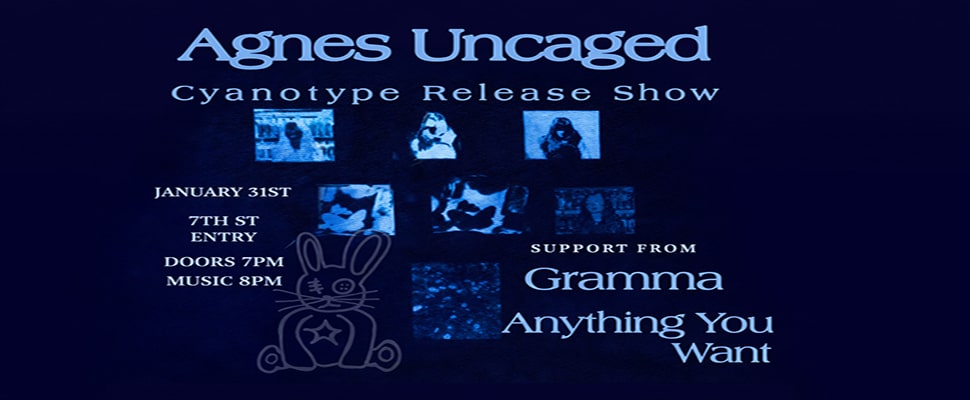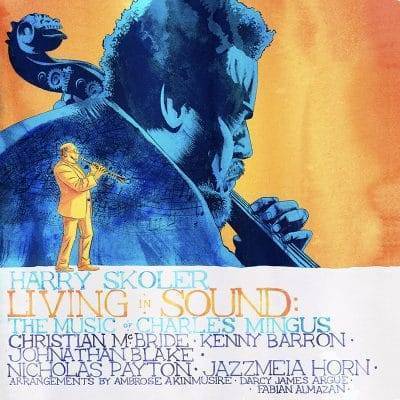Harry Skoler Living In Sound: The Music of Charles Mingus
Living In Sound: The Music of Charles Mingus
Sunnyside
As you all likely know by now, this is the centennial year for Charles Mingus. Clarinetist Harry Skoler has been influenced since adolescence by the iconic bassist and one of the elite composers of jazz. Now, over 40 years later, Skoler, the current professor at Berklee College of Music and working musician who just dodged a life-threatening accident in 2018, has teamed with saxophonist and producer Walter Smith III (who does not play on the album) to collaborate on this tribute to Mingus. Living In Sound: The Music of Charles Mingus salutes with a string quartet, first rate jazz accompanists, and different arrangers for the pieces, with a core of Mingus’ best-known gems along with an original and two others associated with Mingus band members.
The lineup of luminaries is beyond impressive. They include pianist Kenny Barron, bassist Christian McBride, drummer Johnathan Blake, trumpeter Nicholas Payton, and vocalist Jazzmeia Horn. The string quartet has violinists Megan Gould and Tomoko OMura, with violist Karen Waltuch and cellist Noah Hoffeld. The arrangers are among the best too, namely Darcy James Argue, Ambrose Akinmusire, and Fabian Almazan. Skoler is the lead voice with a richly toned clarinet carrying these familiar melodies.
The open with Fabian Almazan’s arrangement of “Goodbye Pork Pie Hat” with the clarinet tones and strings giving it, like many of the others, a relaxed feel that puts an emphasis on the theme, but on the other hand removes the edginess, one of the salient features of Mingus music. The sound is accessible, easy on the ears, and it settles in comfortably. However, the music of Mingus was never of one type and this program touches on the harmonic depth, the tumultuous and meditative sides, and yes, the free abandon too. You just have to wait a bit. The program begins to build toward that fire, with Argue’s dramatic arrangement of “Peggy’s Blue Skylight” using an intricate string arrangement and inspired solo spots for McBride and Barron. Argue also takes “Duke Ellington’s Sound of Love” into interesting territory with an arrangement that straddles the lush and spare, one that Skoler navigates beautifully in his lead, with tones of respect for the composer Mingus most admired.
Ah, edginess comes into full bloom as it should with the Almazan arranged “Remember Rockefeller at Attica” with Barron, Payton, and Skoler in incendiary form. The tone of the piece moves from the frantic to the solemn as the strings take hold. Akinmusire’s arrangement of Don Pullen’s “Newcomer” is the least well-known piece, stemming from the Mingus Moves LP, the one that made its indelible mark on Skoler. This is a highly textured, deep piece marked by a Barron spare piano solo and a gorgeous flowing statement from the leader. Jazzmeia Horn’s superb vocals prove to be the perfect tonic for Doug Hammond’s “Moves” in Almazan’s meditative arrangement. The passage with her scatting flanked by McBride’s lyrical bass and Skoler’s short bursts mid-piece, especially charms. Payton then delivers his own emotive solo before handing off to the leader who masterfully moves between the registers on his clarinet as Blake stirs it up on his kit.
The many patterns of “Sue’s Changes” make it an almost inevitable choice for this program. Argue’s stellar arrangement features riveting ensemble work and Skoler and Payton as the major voices, each playing contrapuntally to each other’s lead. It grows to the frenetic levels around the four-minute mark, receding for a mellow take from Payton, who builds to combustible levels to Barron’s comping and a throbbing rhythm section. Again, the piece dissolves into a pensive harmonic Payton-Skoler passage before regathering momentum and clusters of strident notes from Skoler.
Akinmusire’s arrangements bring a darker, foreboding mysterious tone which color both of his here, the aforementioned “Newcomer” and “Invisible Lady,” which sets Skoler’s classical-like playing against the string quartet to profound effect before the piece morphs into the bluesy style of Mingus. Finally, Skoler adds his original as a closer, the sketch “Underdog,” another dark one, marked by McBride’s bass intro and free improvisation.
The cast has done excellent job of capturing the shifting moods and rhythms of Mingus’ music. There is an emphasis here on the strength of the icon’s compositions more so than on his blurring of free jazz with bluesy structures. Although on the first listen it may seem tame because we don’t often hear the clarinet as the lead voice, subsequent listens reveal depth, nuance, and emotive playing, making this a worthy, respective tribute.
- Jim Hynes
Buy Us a Cup of Coffee!
Join the movement in supporting Making a Scene, the premier independent resource for both emerging musicians and the dedicated fans who champion them.
We showcase this vibrant community that celebrates the raw talent and creative spirit driving the music industry forward. From insightful articles and in-depth interviews to exclusive content and insider tips, Making a Scene empowers artists to thrive and fans to discover their next favorite sound.
Together, let’s amplify the voices of independent musicians and forge unforgettable connections through the power of music
Make a one-time donation
Make a monthly donation
Make a yearly donation
Buy us a cup of Coffee!
Or enter a custom amount
Your contribution is appreciated.
Your contribution is appreciated.
Your contribution is appreciated.
DonateDonate monthlyDonate yearlyYou can donate directly through Paypal!
Subscribe to Our Newsletter
Order the New Book From Making a Scene
Breaking Chains – Navigating the Decentralized Music Industry
Breaking Chains is a groundbreaking guide for independent musicians ready to take control of their careers in the rapidly evolving world of decentralized music. From blockchain-powered royalties to NFTs, DAOs, and smart contracts, this book breaks down complex Web3 concepts into practical strategies that help artists earn more, connect directly with fans, and retain creative freedom. With real-world examples, platform recommendations, and step-by-step guidance, it empowers musicians to bypass traditional gatekeepers and build sustainable careers on their own terms.
More than just a tech manual, Breaking Chains explores the bigger picture—how decentralization can rebuild the music industry’s middle class, strengthen local economies, and transform fans into stakeholders in an artist’s journey. Whether you’re an emerging musician, a veteran indie artist, or a curious fan of the next music revolution, this book is your roadmap to the future of fair, transparent, and community-driven music.
Get your Limited Edition Signed and Numbered (Only 50 copies Available) Free Shipping Included
Discover more from Making A Scene!
Subscribe to get the latest posts sent to your email.









